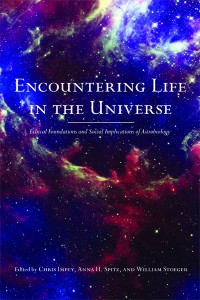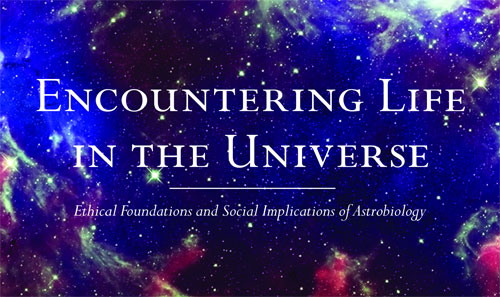Members of the University of Arizona’s faculty and staff recently published a book in which they speculate about extraterrestrial life and the potential moral and ethical implications of encountering such life.

Book cover. (Credit: University of Arizona Press)
University of Arizona (UA) scientists compiled and edited a collection of works by astronomers, philosophers, and biologists, which makes up the new book Encountering Life in the Universe: Ethical Foundations and Social Implications of Astrobiology. Its description on Amazon.com explains that the book
examines the intersection of scientific research and society to further explore the ethics of how to behave in a universe where much is unknown. Taking contributions from notable experts in several fields, the editors skillfully introduce and develop a broad look at the moral questions facing humans on Earth and beyond.
According to UANews, the idea for the book stemmed from a UA conference held in 2008 on the ethical implications of astrobiology. Revealing the impetus for the book, one of its editors, Chris Impey, UA distinguished professor and deputy head of the UA Department of Astronomy and Steward Observatory, explains, “We wanted to recognize that if we find life elsewhere it’s not just going to be a second version of biology, it’s going to raise a whole set of other issues . . . For example, do we have the right to mine or alter other worlds? Do we have the right to mess up our own planet?”
UANews describes that, in the book,
Contributing authors discuss questions of how to behave in the universe, how we should treat inhabitants of other planets if or when we reach them, whether or not we have a right to make use of their resources, and perhaps most importantly, how will we relate to other life forms, intelligent or otherwise, if we encounter them?
So when do these researchers believe life will be discovered elsewhere in the universe? Impey explains, “I’ve asked as many researchers in this field as I can, what do they really think . . . And most of them say within five to 10 years we’ll probably find life elsewhere.”
Encountering Life in the Universe: Ethical Foundations and Social Implications of Astrobiology was published by the University of Arizona Press, and is available now at Amazon.com.
 Openminds.tv Credible UFO / UAP News and Information
Openminds.tv Credible UFO / UAP News and Information






What technologies will progress enough to allow us to discover alien life within the next 5 to 10 years? Will we be able to travel to distant earth like planets? Will seti discover a signal? Will we discover life in our own solar system or will the aliens discover us? I would like to know how these scientists believe this time table. My bet is we’ll find life in our own solar system.